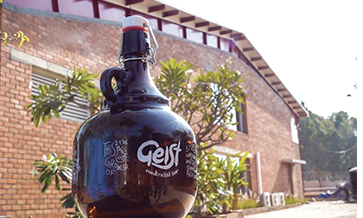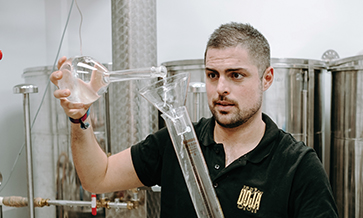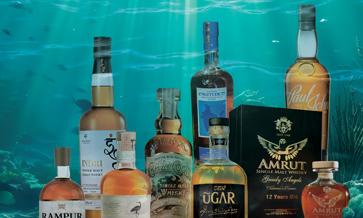How path-breaking brands in India are seeking out opportunities, facing challenges and defining growth strategies
It was the best of times, it was the worst of times – that famous opening line of Charles Dicken’s novel, A Tale of Two Cities, could well apply to the Indian bar industry today. Minakshi Singh, a partner in New Delhi’s award-winning Sidecar, says this is the best time for the Indian bar industry in the last 18 years that she has been associated with it.
She attributes this to the entire beverage and hospitality ecosystem now coming together in support of bars: from beverage manufacturers to service providers, and most definitely some of the talent that we now have behind the bar.
There is a cultural and societal shift in that alcohol is no longer taboo – this has been hugely influential in our slow coming of age as a bar nation. India now has three bars in the World’s Top 100 list. Sidecar is in the Top 50, and the other two – Hoots in New Delhi and Bar Tesouro in Goa – are in the next 50. Sidecar is also the #14 bar in Asia’s Top 50 list.
Indian bar talent is also scattered across the globe – from Dev Sehgal at Hong Kong’s Mandarin Oriental, to Ashish Sharma at Miami’s Four Seasons, to Hemant Pathak at New York’s Junoon.
Some of that talent has begun to drift back to Indian shores, no doubt buoyed by the current opportunities in India’s emerging bar scene. Among them are Santanu Chanda, Olson Pereira, Santosh Kukreti and Roger Gomes.
Apart from pure-play bars, alcoholic beverages also play a key role for restaurants to increase their revenues and are, therefore, getting long delayed attention. Leading restaurateurs like Riyaaz Amlani (Social) and Anjan Chatterjee (Hoppipola) have also cashed in via these casual all-day outlets with an equal focus on drinks and food.
And 5-star hotel chains such as the Taj, Leela and Four Seasons have realised the importance of bars in acting as a key beacon for their hotels in cities across India.
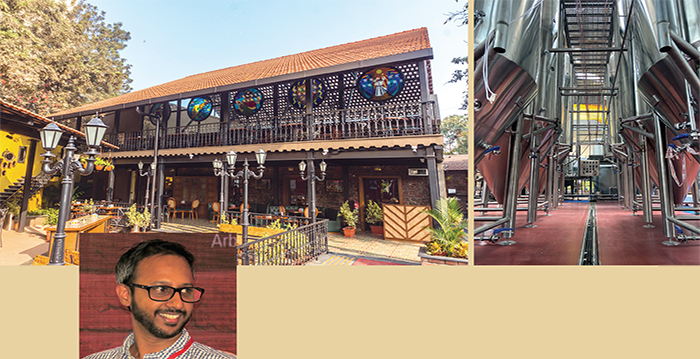
After a successful run in Bengaluru, Toit micro-brewery has opened taprooms in Mumbai and Pune (L). It has invested in a new brewery (R) to supply its popular craft beers in kegs and bottles. Its prime mover, Sibi Venkataraju (inset), prefers a single malt to unwind at the end of a hectic day.
Trend-setters
But India is still very much a work in progress, when you compare the bar culture in Singapore and India, which began to emerge and evolve around 2010. Not to speak of other cities like Hong Kong and Bangkok, which have a dynamic and flourishing bar-n-beverage scene.
A large part of the evolution of India’s bar sector and bar culture is due to the efforts of a path-breaking group of bar owners, some of whom we spoke to in detail, in a bid to understand their journey and where it is likely to take them in the future. Their answers are indicators to the evolution of India’s bar scene as a whole.
Sibi Venkataraju is a prime mover of Toit, along with his partners, Arun, Mukesh and Glen, with micro-breweries and taprooms in Bengaluru, Pune and Mumbai.
Minakshi founded Cocktails and Dreams Speakeasy and Sidecar along with Yangdup Lama, with Gaurav as a third partner in Sidecar.
Rakshay Dhariwal and his sister Radhika founded PCO Hospitality, one of India’s most successful bar-focused chains, with 17 bars and restaurants across the country. These include PCO (one of the bars that helped spark the cocktail culture, when it opened 10 years ago), Ping’s, PDA, Saz and Jamun.
Vipin Raman of Goat Hospitality, the company behind Jamming Goat and Jamming Goat 3.0 in Goa, and Inanna, an upcoming taproom in Bengaluru. Along with business partners Avinash, Sombir, Varuna, Saurabh and Thejas, Goat Hospitality also manages Raahi in Bengaluru and Voila in Hyderabad.
Then there is Vaibhav Singh of Perch, with four outlets in Delhi and Mumbai; and Hoot’s, a cocktail-centric outlet in Vasant Vihar, Delhi.
Together they make up an impressive cast and are responsible, along with a few others across India, for shaping India’s bar scene over the next 5-10 years. Let’s look at how they perceive some key aspects of their business, and how they are programming themselves for growth and expansion.
Team play
It all starts here: the founding team and how they are organised, and how successful they are in recruiting top talent to help realise their vision. Goat Hospitality has roles sharply divided amongst its founders.
Vipin Raman primarily looks after branding; Avinash and Thejas after the beverages programme; Sombir and Saurabh look after the kitchens; and Varuna oversees operations.
We ask Vipin how six people at the helm of affairs handle conflict and egos. “Our roles are sharply defined,” says Vipin. “We do consult each other initially; but once operations start, we don’t step on each other’s toes, or point fingers if there’s a problem.”
On the other hand the six together gives Goat Hospitality the much-needed bandwidth as they grow their business steadily across India.
In the case of PCO Hospitality, Rakshay is the MD and Radhika the Vice-Chair. A chain as far-flung as PCO does also have centralised functions, with key people looking after areas such as marketing and operations.
There are senior people in key positions in different groups: Rahul Gomes Pereira, the Executive Chef at Passcode Hospitality; Christopher Champalle at Toit looks after the group’s brewing operations; and Rohan Matmary at Speaks and Sidecar looks after beverage operations.
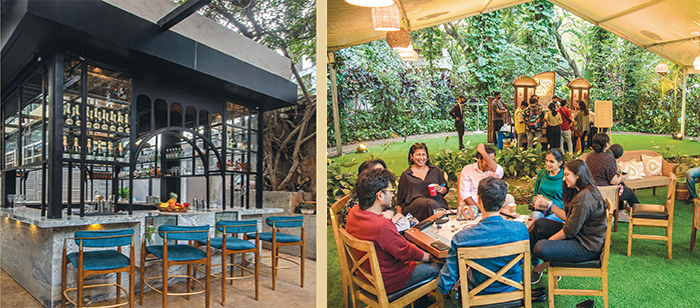
From a single outlet, Delhi’s Pass Code Only (L), Rakshay and Radhika Dhariwal (Cover Page, right) now run 17 properties. Their India Cocktail Week (R) is a resounding success, attracting 5,000-odd consumers each day.
Concept & DNA
The importance of knowing what you stand for and how clearly defined your format is cannot be over-emphasized. Especially so in a market like India, where herd mentality still prevails, and originality is rare.
“In India, there is enough – and more – space for many bar concepts. Define your style and stick by it,” says Vaibhav, whose Perch outlets bring a welcome touch of the “whimsy” (in the words of one of his peers), and some old school thinking too.
These are very much the building blocks for any great bar, or bar chain, especially if they hope to replicate themselves across a challenging geography and market such as India.
For Minakshi, Sidecar (New Delhi) and Cocktails and Dreams Speakeasy (Gurugram) are defined as friendly neighbourhood bars, anchored by great bartenders, approachable cocktails, and a buzzing roster of gigs.
Perch began in 2015 as a coffee and wine bar, with a focus on making coffee geekier (this was in the pre-Blue Tokai days) and wine more accessible to people.
Perch is also a neighbourhood bar, Vaibhav says, with an understated but discerning personality. “It looks very easy on the eyes, but still has a certain nuance, an easy place for a discerning crowd.”
According to Rakshay, PCO’s DNA lies in its people, who have been with the group for a while now and have a commonality of thinking. This is crucial for a group that employs hundreds of people across multiple locations in India, and has grown from a single outlet 10 years ago to 17 now.
Boot-strap beginnings
The people we spoke to indicated that all funding had been raised internally, through the partners themselves, and in some cases their extended circles of friends and family. The founders are not averse to raising external capital, but are conscious of the fact that they would do it only once they had reached a certain scale, or had re-oriented their business to give it more a holistic flavour.
Toit’s Sibi says, “Hospitality has not yielded the kind of returns that were promised to external investors. It is a challenging business to raise capital. Hospitality is not able to match the kind of growth and valuations that, say new-age businesses in information technology can.”
So Toit is moving into packaged beer and cider through two wholly-owned subsidiaries. “That would make us not just a beer hospitality business; it would make us more attractive for investment, if required,” Sibi says.
Vaibhav of Perch would like to get to at least six outlets by himself before looking at raising funds for further expansion.
Rakshay of PCO is quite confident of reaching 30 outlets, based on internal accruals and funding, after which his company would evaluate raising capital. “And at 100, we might think of an IPO,” he smiles cryptically.
Even during the thick of the pandemic, with the hospitality business amongst the worst hit, bars were still being opened and the business diversified, to ensure that all eggs are not in one basket.
Some have been judicious and conserved capital and liquidity during the Covid-19 lockdowns. Toit, which closed down its sister brand in Bengaluru, The Permit Room, insists it’s a stop-gap arrangement.
Business formats
With its recent diversification into kegged beer, Toit is now better placed to open new outlets; but we sense that its expansion will be more in the local markets. With kegs on offer and a new commercial brewery on the outskirts of Bengaluru, Sibi confirms plans to increase their taproom numbers, and launch packaged bottled beer under its brand.
Jamming Goat in Goa’s Utorda is just off the beach, and is an outlet with the beach vibe and sensibilities. It comes with the handicaps that may affect such outlets, in terms of seasonality and maintenance.
Jamming Goat 3.0, which opened recently in Goa’s famous beach-strip Calangute, is a city-focused outlet. At the time of expansion, Vipin can use either format as required, depending on the location.
When Rakshay of PCO opened his first Pings, it was as Pings Café Orient, a family restaurant in New Delhi’s Lodhi Colony. The same brand, when transported to Goa, became Pings Bia Hoi, a Vietnamese beer garden format! And as Pings expands across India, Rakshay now picks and chooses which format to use, based on the new location.
Branching out
Apart from expansion plans, one of the most interesting insights for us was how these businesses are diversifying their portfolios. The pandemic was, of course, the trigger; but there was growing realisation that it was imperative was to build a more “well-rounded business” as Sibi said earlier.
For Minakshi and Yangdup Lama, services were one immediate diversification, helping brands in the area of product development and training. The pandemic made them also dig deep into their Rolodex and realise the potential of the treasure trove of high-level corporate contacts they had developed over nearly a decade of running Speakeasy.
Online cocktail workshops, supported by the delivery of bar kits and mixers, were also an easy spin-off for them. But the most interesting move by far for the duo has been the opening of Bhumi, a farm that doubles up as a dining destination, along with the pleasure of spending a full day in the outdoors, closer to nature, for families.
Bhumi acts as fertile farmland, with its soil assessed to arrive at ideal fruits and plants to grow. It’s already a feeder of preservative-free ingredients for their bar kitchens. Minakshi doesn’t rule out launching their own beverage brand down the line, but her lips are sealed for now!
Although no craft beer company has yet achieved success by selling packaged beer, Gaurav Sikka of Arbor Brewing set a precedent by launching beer in cans from his green-field brewery in Goa.
Sibi is confident that Poit’s phased approach and intimate knowledge of the local market, combined with the brand that they have built, will lead to success. “We don’t have the pressure of external investors to force our hand,” he says.
Also on the cards for Toit is the launch of an apple cider brand in cans from a facility set up in Himachal Pradesh through a tie-up with the state government. The cider will be sold first in neighbouring Chandigarh and Punjab, and then get on retail shelves in Bengaluru.
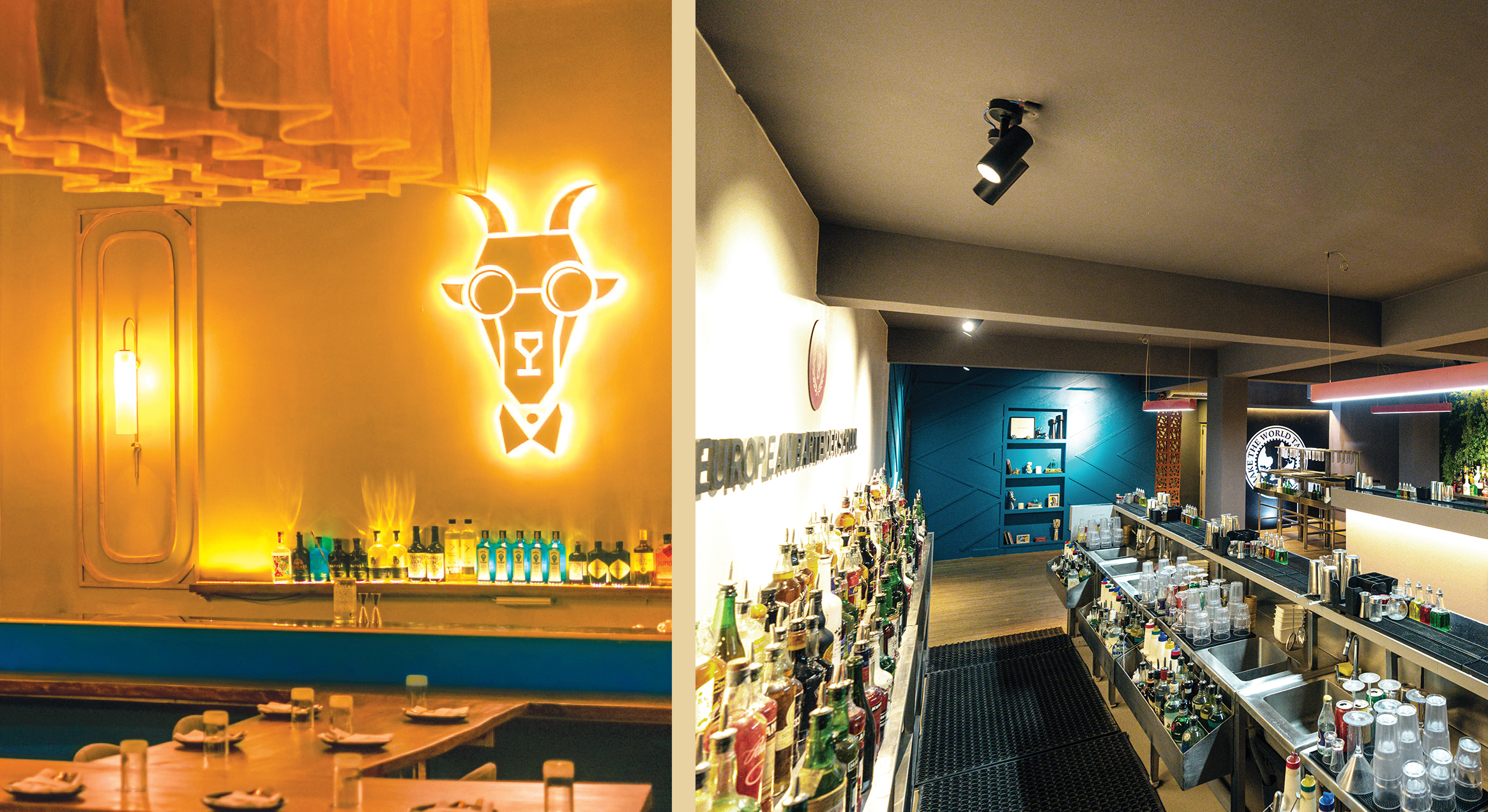
Goat Hospitality, the company behind Jamming Goat and Jamming Goat 3.0 in Goa (L), manages Raahi in Bengaluru and Voila in Hyderabad. Vipin Raman runs the European Bartending School (R).
Franchise pains
Expanding solely on one’s own steam can put a lot of strain on the brand, especially as one must ensure consistency of offering and experience, apart from requirement of capital. In their zeal to expand entrepreneurs can over-extend themselves.
For many in the hospitality business, a franchise-based arrangement has typically been the way to go. It is challenging, of course, to replicate the parent company’s DNA and work ethos, or even a location.
Understandably, not many that we spoke with were gung-ho about treading this path. For these entrepreneurs it’s almost as personal and difficult as finding a foster mother for their baby!
Minakshi says the prerequisites for the success of the franchise model in the F&B industry are common templates, process-driven operations and standard operating procedures that can be replicated by the franchisee.
“Our product is very intangible,” she says, “There are some things that we can’t put into an operating manual.” Vaibhav seconds her, saying, “SOPs will take the soul out of our business!”
Minakshi’s Speaks and Sidecar are neighbourhood bars, but if she were to introduce them into Mumbai, then Sidecar would be more suited to South Bombay and Speakeasy perhaps to a more easy-going, suburban locale.
Goat Hospitality is approached by investors from time to time. After careful vetting, they work out a model wherein the investment in an outlet comes from another source, but the Goat team is fully responsible for operations and management.
That’s a model Vipin and his team has adopted with Raahi and Voila – and the upcoming Inanna in Bengaluru.
Some brands are unlikely to travel, such as Hoot’s, a cocktail-focused bar located within the Perch property in Vasant Vihar. Vaibhav fees that as a format it may be difficult to expand on a stand-alone basis.
Desh Videsh
Rakshay has, however, used a franchise model to expand into the Kolkata market with Saz and Pings, while for a couple of more outlets (Saz on the Beach in Goa and Saz Promenade in Delhi0 are coming soon.
Rakshay has invited external investment from people he knows well and has worked with on other ventures. PDA in Delhi is a joint venture with Ritu Dalmia, whose signature outlet Diva occupies the first floor. PDA, a cozy cocktail bar, takes the ground floor.
Ajay Nagarajan of Windmills Craftworks (Bengaluru) has already gone international with the opening of Windmills in Texas (US) in 2020. What about venturing outside India, we ask.
“India is underserved and under-serviced,” feels Vaibhav, and seems very clear that his expansion will primarily be in India.
Minakshi has also had had offers for overseas expansion, but says India is a very good place to be. “What works for us is a close understanding of the local customer. It would be presumptuous of us to think of an international market and think we can open an outlet abroad,” she says.
Vipin at Jamming Goat sees his company’s next big move as an international destination. “It would have happened earlier if not for the pandemic,” he says, adding: “Increasingly tight restrictions on bar operations in most Indian cities choke the business. It blocks the evolution of the consumer by hampering the discovery of new bar formats and drink experiences.”
Rakshay sees an enormous opportunity to tap the global appetite for Indian food by exporting Jamun, his Indian fine dining concept. He is also keen that every Jamun property that opens overseas (beginning in 2022) also has PCO as a speakeasy within.
Blessing in disguise
Even before the Covid-19 pandemic struck, Rakshay had created a joint venture with PCO Hospitality to initiate India Cocktail Week (ICW), a large-scale consumer event that gave brands a platform to directly interact with consumers.
ICW made its hugely successful debut in Bengaluru in 2019, attracting as many as 5,000 consumers to the venue each day! This was especially important for new and small brands trying to make their presence felt.
ICW plans multiple editions across three centres – Hyderabad, Mumbai and Goa – each typically bringing in 50,000 highly targeted consumers for drinks brands to interact with and convert.
But Rakshay’s latest passion and “lockdown baby”, one that is consuming all his time and attention of late, is Maya Pistola Reposado. Aware that a lot of his friends and clients across bars were shifting from vodka/gin tonics to Tequila and tonics, Rakshay turned his attention to agave-based spirits.
Sourcing the spirit from a manufacturer in India (see Pg 45) he has rested it in oak barrels. More variants of Pistola are also planned, and Rakshay is now quadrupling his volumes. The Old Fashioned that he likes to drink to unwind has now had its spirit base shifted from Bourbon to agave!












